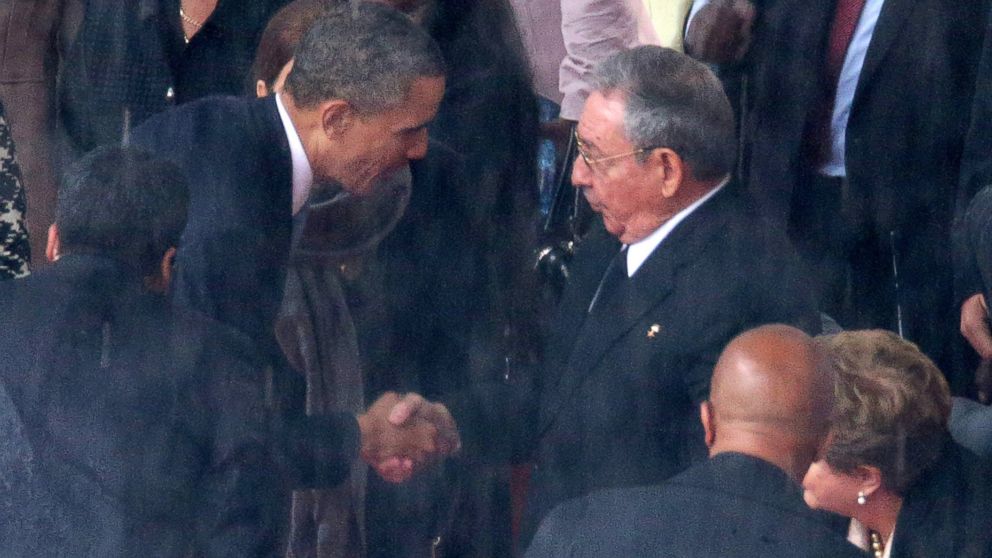By Nora Gamez Torres, Miami Herald, October 6, 2014
 |
| Presidents Raul Castro and Barack Obama at the memorial service for Nelson Mandela in South Africa |
President Barack Obama tapped Spanish Ambassador Miguel Angel Moratinos to deliver a message to Raúl Castro in 2009 and urge him to reciprocate a decision to lift the travel restrictions for Cuban Americans, according to a recently published book.
In the book, Back to Cuba Channel: The Hidden History of Negotiations Between Washington and Havana, William LeoGrande and Peter Kornbluh document the message sent to Castro via Moratinos: “Tell the Cuban authorities that we understand that things can’t change overnight but down the road, when we look back, it should be clear that this was the moment when changes began.”
Castro responded with a proposal to open a “secret channel of communication,” but the White House replied that any conversation should take place through the “existing channels.”
The authors of the book, which tells the story of secret negotiations between Cuba and the United States in the past 55 years, argue that although Obama has recognized the futility of a hostile policy, he has not been more willing than his predecessors to break the impasse.
The reasons are perhaps in the “lessons” the authors summarize at the end of the book: “The United States has been content to live with ‘perpetual antagonism’ toward Cuba because costs have been relatively low, and changing the policy entails domestic political risks that successive presidents have judged too high.”
Kornbluh told the Herald that the “lessons” have to do with what has happened in the past 55 years and not with the current context.
“Domestic politics in the United States is a major impediment since the end of the Cold War but things are changing in terms of public opinion in Miami and Florida,” partly as a result of Obama's own policy of allowing Cuban Americans to freely travel back and forth to Cuba, Kornbluh said.
Another factor he mentioned is that President Obama is a Democrat in his second term, so he is not as concerned about the impact of a policy change.
“Florida is clearly not being considered by Hillary Clinton as a major swing state and she has made public her position that the embargo is a bad idea for U.S. policy,” he said. “The United States also has regional imperatives to change its policy. Look, for example, what just happened with this Summit of the Americas, in which the United States is isolated and not Cuba.”
Kornbluh further noted that “major leaders of the Cuban-American community like Alfonso Fanjul, are quietly pushing for an opening to Cuba and going to Cuba. The hardliners are much more isolated. Unfortunately, one of them, who is not even from Miami, Robert Menendez, holds a very influential position in the Senate.”
While lifting the embargo will need a vote in Congress, President Obama could take other routes.
“Obama can – and this is one of the most politically difficult things – trade these three Cuban spies who have been imprisoned in the United States for more than 15 years for Alan Gross, who has been in prison almost five years,” suggested the author, who argues that history gives Obama a basis for making changes.
One of these precedents is described in Back Channel to Cuba. In the spring of 1963, John Kennedy traded four Cubans who were imprisoned in American jails, including a Cuban who had accidentally shot a nine-year-old Venezuelan girl in the back and had been convicted of second-degree murder, for a large group of American citizens in Cuban jails, including three CIA agents who were caught planting listening devices in a Chinese media office that was being constructed in Havana.
“The intelligence services of Cuba, like the CIA would, want their three guys back and they see Alan Gross as the only leverage to get them back. That is the most difficult point in the broader picture of trying to change the framework of relations,” Kornbluh said.
Although nationalist rhetoric is still strong in political speeches and Cuban media, Kornbluh said that “the Cuban Revolution is no longer trying to consolidate itself on the basis of its nationalism and anti-imperialism. Cuba just wants to have a mutual respect and peaceful coexistence with all nations in the world, particularly the Goliath of the North.”
No comments:
Post a Comment